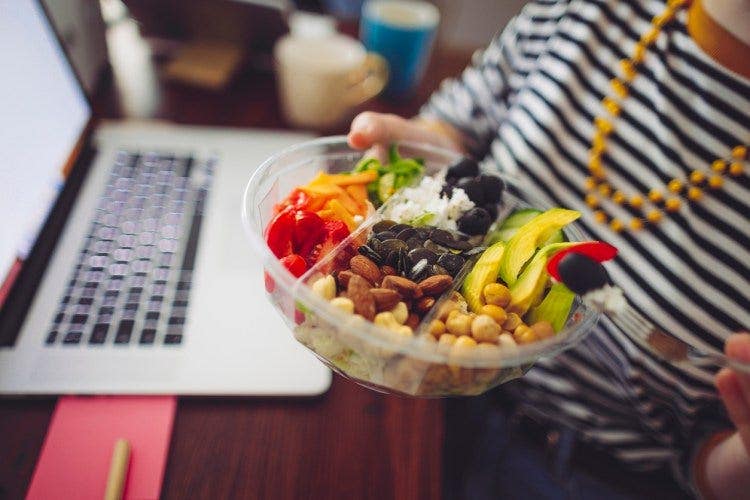Healthy Study Snacks for College Students

Eating for brain health offers numerous benefits. A diet that includes brain-healthy foods, such as berries and dry-roasted nuts, has been shown to reduce the likelihood of developing Alzheimer’s disease and slow the aging of the brain by more than seven years, the Mayo Clinic reports.
Eating healthy while studying — as opposed to grazing on candy and potato chips while drinking soda — is also beneficial. Snacking on certain types of processed foods can lead to a rapid spike in blood sugar levels, which can prompt the body to speed up the production of insulin to keep blood sugar levels consistent. When the body produces too much insulin, it can cause blood sugar levels to drop too quickly, which can prompt a sudden drop in energy levels (commonly known as a “sugar crash”). Knowing what to eat (and not to eat) while studying can help set students up for success.
The Best Foods for Studying
Whether you’re studying for exams or writing a paper, here are a few healthy study snacks that are worth keeping on hand:
- Nuts: Nuts such as almonds and walnuts contain protein and healthy fats. Eating them may improve cognitive function, according to a 2020 study in the journal Nutrients.
- Edamame: Edamame (young soy beans) is a brain-healthy food packed with choline. This essential nutrient has been shown to support brain health and development.
- Apples and nut butter: Apples are a low-calorie, nutrient-dense, brain-healthy food and a rich source of antioxidants, which help nourish and protect the brain. You can also pair apples with nut butter to make an easy, two-ingredient, satiating snack.
- Vegetables and hummus: Hummus is made from chickpeas, which are a great source of protein. Vegetables — especially orange, green, and red ones, such as bell peppers and carrots — have been shown to boost mental performance. This snack is an ideal choice for students who prefer savory foods.
- Berries: Strawberries, blueberries, and blackberries are high in anthocyanins, which is a type of flavonoid compound. Anthocyanins may increase blood flow to the brain and improve mental performance, according to a 2019 Nutrients study.
- Dark chocolate: Dark chocolate is also high in flavonoid compounds. In addition to helping improve mental performance, flavonoid compounds can also improve insulin sensitivity, which may help ward off sugar crashes.
- Eggs: Hard-boiled eggs are a great study-time snack choice. In addition to being packed with protein, they include vitamin B12, selenium, and choline, which support brain function.
- Avocado toast: Avocados are high in a type of carotenoid called lutein. Studies have linked lutein to brain and eye health. If you’re not prone to snacking on avocados by themselves, mashing them onto whole-grain toast also makes for a great study food.
- Cheese: Cheese is high in protein, which can help satisfy cravings and ward off hunger. Furthermore, cheese can benefit brain function, a 2020 article by Healthing notes.
The Worst Foods for Studying
While numerous snacks are ideal for studying, you should steer clear of certain foods. Below are just a few of the most common offenders:
- Soda: Sugary drinks, including soda and energy drinks, aren’t the best choice while studying. Individuals who consume sugary beverages are more likely to have problems with memory, WebMD reports.
- Refined carbohydrates: Potato chips, crackers, and candy aren’t just high in calories; they’re often nutritionally void. Additionally, eating refined carbohydrates can cause insulin levels to spike, which can cause a sugar crash.
- Foods that are high in trans fats: Fried, processed foods can cause inflammation in various parts of the body. In some instances, this inflammation may damage blood vessels that carry oxygen to the brain, WebMD reports.
- Caffeine: Coffee may have short-term benefits, such as improved reaction times and increased alertness, but the boost is temporary. The saying “what goes up, must come down” holds true for caffeine spikes. Once the effects of your espresso, latte, or double hammerhead wear off, you could experience a notable energy crash. Instead, try a brewed tea with much lower caffeine levels, such as green tea, or even a decaf coffee or herbal tea.
Fuel Your Body, Fuel Your Mind
Athletes training for marathons and triathlons understand the importance of fueling their bodies with the right types of foods. A well-planned diet not only helps meet their nutritional needs but also ensures their bodies have the protein and fuel to optimize their athletic performance.
For students, eating to optimize brain performance is just as important. Choosing the right foods helps you feel better physically, and healthy study snacks are also better for your cognitive function.
Whether you’re a current student or interested in enrolling in an online degree program, eating for brain health is beneficial. Are you ready to take the next step toward earning a bachelor’s degree, master’s degree, doctorate, or certificate online? Read more about the various online degree programs that Maryville University offers to find the right one for you.
Sources
EatingWell, “Best & Worst Foods for Brain Health, According to Dietitians”
Eat This, Not That, “5 Worst Foods for Your Brain, According to Doctors”
Healthing, “Finally, Good News: Cheese Is Good for Our Brain”
Healthline, “8 Impressive Health Benefits of Apples”
Healthline, “Reactive Hypoglycemia: How to Spot and Treat a Sugar Crash”
Healthline, “The Top 9 Brain Foods for Studying and Exams”
Healthline, “What Is Choline? An Essential Nutrient with Many Benefits”
Mayo Clinic, “Improve Brain Health with the MIND Diet”
Medical News Today, Refined Carbs: What They Are, and How to Avoid Them
Nutrients, “Beneficial Effects of Walnuts on Cognition and Brain Health”
SnackNation, “14 Healthy Study Snacks to Keep Your Focused in 2022”